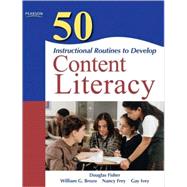From some of the best-known authors in the field comes a book that provides all middle and high school teachers with practical information about improving students’ reading, writing, and oral language development. Every teacher needs to use instructional routines that allow students to engage in all of these literacy processes. Classroom examples from science, social studies, English, math, visual and performing arts, and core electives ensure that all middle and high school teachers will find useful ideas that they can implement immediately.
This book provides readers with examples of fifty evidence-based instructional routines that can be used across content areas to ensure that reading and writing occur in all classes.
Evidence-based-a clear research base is presented with every instructional routine, helping you further understand when and why a particular approach should be used.
Practical examples-for each instructional routine presented, a practical example is provided that illustrates ways this routine has been used in today's classrooms.
Quick reference — instructional routines are arranged alphabetically, and an index on the inside front cover specifies the literacy focus for each strategy and whether the strategy is meant to be used before, during, or after reading.
Instructional routines- recommended actions a teacher can take to foster comprehension, such as thinking aloud, using Question-Answer Relationships, and teaching with word walls.








